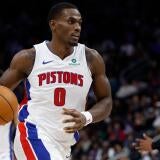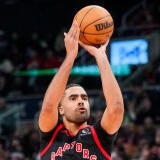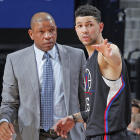Clippers demoting Doc Rivers could signal the end of coach-GM hybrid era in NBA
Can you make it work with a coach who's also in charge of basketball operations?
Absolute power in the NBA may not corrupt absolutely, but it looks like it certainly weakens your job security.
On Friday, the Los Angeles Clippers announced a restructuring of their basketball operations department. Longtime scout and executive (and former Nets coach) Lawrence Frank was promoted to the new head of basketball operations. Doc Rivers has returned to the role he held prior to the ousting of Donald Sterling three years ago, as just coach.
It's a demotion. There's no way of getting around that. The Clippers stressed that Frank and Rivers would continue to work side by side, and that will almost certainly be true. Rivers will be involved in every decision made when it comes to roster and team direction. But three years ago, Rivers was essentially placed into the position of being the single most important guy in the Clippers organization. He was in charge of who was on the team, who wasn't, trades, free agency signings, how the team played, everything. He still has autonomy over how the team plays, but those other decisions are clearly being moved under Frank's direction, even if Rivers will have a say.
The Doc's diagnosis
The move wasn't shocking. You can lob any number of criticisms at the city Rivers built with the Clippers since his arrival. The team has never advanced to a conference championship. They faced constant drama and a sense of team dysfunction. But more directly, Rivers constructed the team like it was 2010. The most common criticism was that if you were a good player in 2010, you had a better than even shot Rivers would try to sign you as he went through a steady string of rehash players. An incomplete list of players the Clippers at least kicked the tires on since 2014:
- Nate Robinson
- Hedo Turkoglu
- Jordan Farmar
- Chuck Hayes
- Glen "Big Baby" Davis
- Raymond Felton (which worked out well)
- Luc Richard Mbah a Moute (which also worked out well)
Rivers never invested in young talent. His draft picks were either traded or used on players who never saw their floor and then quietly faded away. The lone exception to this rule being his son, Austin Rivers.
The father-son dynamic is increasingly difficult to talk about. Rivers has legitimately become a good rotation guard. He defends at a high level, can shoot a little bit, learns a little more about how to run an offense every year. But reports that players resented Doc's treatment of his son persisted, even while it was revealed that their relationship isn't exactly warm and fuzzy. This element is used most commonly as the key criticism of Doc, and while we'll never really know what the team dynamic was like, Austin has become a useful guard for the Clippers and the Clippers never gave him a max contract or anything of the sort.
More worrisome is that Austin is the lone exception to the rule, which is that no young talent has developed with this team. While the Warriors have not only turned their high draft picks into legends, they've also found ways to get minutes from guys like Ian Clark, Patrick McCaw, and others, including actually involving them even in the NBA Finals. The Spurs have done the same. The Clippers, meanwhile, had their two used-to-be-young studs in Blake Griffin and DeAndre Jordan, and then other than that, it was veterans all the time, every day, all day.
Had Rivers found some depth with guys with athleticism, they might have helped get the team where it needed to go. Many of the Clippers' postseason failings can be pointed elsewhere: injury in 2016 and 2017, and bad luck (Josh Smith raining 3's in Game 6 of the 2015 series vs. Houston), but having other players who could step up and fill roles on cheap contracts might have changed L.A.'s fortune.
And in the end, Rivers was the GM responsible when Chris Paul decided he'd rather be traded to Houston and forgo free agency, cutting a year off his potential raise structure, than stay with the Clippers. Rivers is reportedly a significant reason for Paul's departure, including a report that Paul grew to "despise" Rivers. These things are always painted as more dramatic in retrospect than at the time, but it's still notable how often Paul barked at Rivers on the bench last season. Any GM that sees a superstar of Paul's level depart is usually held accountable. That may not have been the only reason for this decision, but Paul's departure, to a Western Conference rival no less, didn't help matters.
A concerning pattern
The GM-coach combination used to be more popular. It was used regularly throughout league history until the mid-2000's, when there came to be a more clear separation of powers. Gregg Popovich's role as a true partner to R.C. Buford in San Antonio is often cited as a case where it works, but that also pretends that any team can truly replicate what the Spurs have created in San Antonio over -- seriously -- 19 years. For years, there was a stronger silo'd divide. Front offices managed the team and coaches coached. That started to change a few years ago.
Alongside Rivers, we saw Stan Van Gundy, Tom Thibodeau, and Mike Budenholzer moved into similar roles wearing both the GM/president of basketball operations and coach's hat. Let's catch up on where those are at:
- Budenholzer has also moved back into a coaching-only position. He also moved into that role after upheaval, as he replaced Danny Ferry in Atlanta.
- Van Gundy remains in power in Detroit, and this is being described in some circles as a make-or-break season for SVG. His job was described as safe back in April after last season's disappointment, but the issues with Detroit go beyond the wins and losses. There was widespread team dysfunction last season, with both Reggie Jackson and Andre Drummond reportedly involved in trade discussions. Those two are the centerpieces of the team. Jackson was recovering from injury, and the team aggressively tried to shut down rumors that they could move on from Drummond, but the perception remains league-wide that he's available for the right price (like almost any non-mega-star player). If the team has another down year, or if trades backfire on them, it's not inconceivable a change could come for Van Gundy as well after three seasons. It should be noted most of their free agent moves have been greeted with positive regard.
- Thibodeau is only going into his second season, but his first was a massive disappointment, as the Wolves were widely expected to make the playoffs and instead finished well off the mark. The additions of Jimmy Butler and Taj Gibson have their preseason expectations reset to a high level, with some feeling they could contend for home court next year. It's too early to judge Thibodeau, but expectations are working against him more than anything.
Is the coach-GM era over?
The reality is that you have to have a balance. A lot of teams have failed because teams hired a coach, and then didn't involve the coach in roster-building decisions. The coach has to be on the same page with the GM, and vice-versa. There has to be a consensus about which players fit the team and system that will be run, relative to short and long-term goals. The thought process behind the coach-executive is that you consolidate those decisions into one person, and in doing so, improve synergy. All the coaches in that position have a GM or other executive who handles the day-to-day tasks and helps navigate the legal and cap restraints of acquisitions.
Coaches will often impress owners and create stronger bonds because of their higher profile and experience. The rise of executives with business or analytic backgrounds has created a backlash not only with former players who want those jobs, but among coaches as well. If an owner leans towards trusting a "basketball mind," these kinds of situations will remain popular.
However, involving a coach in front-office decisions, giving him a strong voice in the room, and formally giving him a title with official front-office capacities are different matters.
Teams will largely still prefer to silo these decisions. The struggles of Rivers and the others listed above will likely limit a proliferation of these types of combination setups going forward, though it will always depend on the owner involved. And there are certainly situations where it seems like a coach-executive might be the answer. Sacramento, for one, could benefit from a consolidation of power as they rebuild, with a stronger voice able to maybe resist meddling from Vivek Ranadive or other minority-ownership parties.
Rivers' "reassignment" doesn't remove him from the power structure in Los Angeles. But it is reflective of owner Steve Ballmer's intention towards accountability, and a willingness to pursue alternatives if a current structure isn't working. Rivers' contributions to the franchise, not only in wins, but in shepherding the team through an emotional and tumultuous time following the Donald Sterling debacle cannot be overlooked.
But Rivers also provides a lesson that while coach-GM situations aren't inherently flawed, and indeed, the Clippers were far from a failure with Rivers in charge of basketball operations, in order to get the most out of the situation, you have to have the right coach with the right mindset ... and a bit of luck.
And luck has never been on the Clippers' side.


















